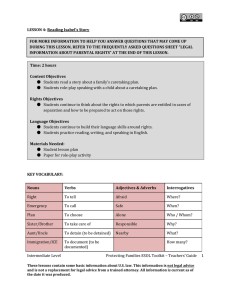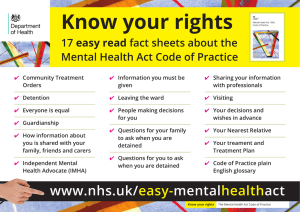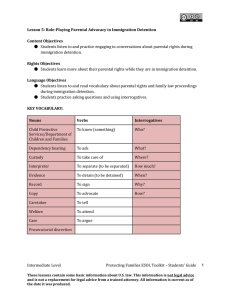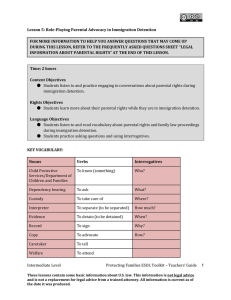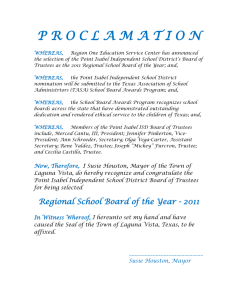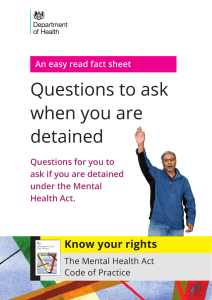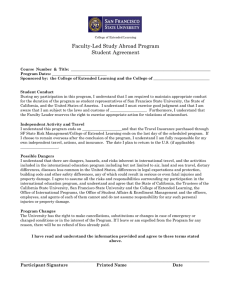April 2016 Students read a story about a family’s caretaking plan. ●
advertisement
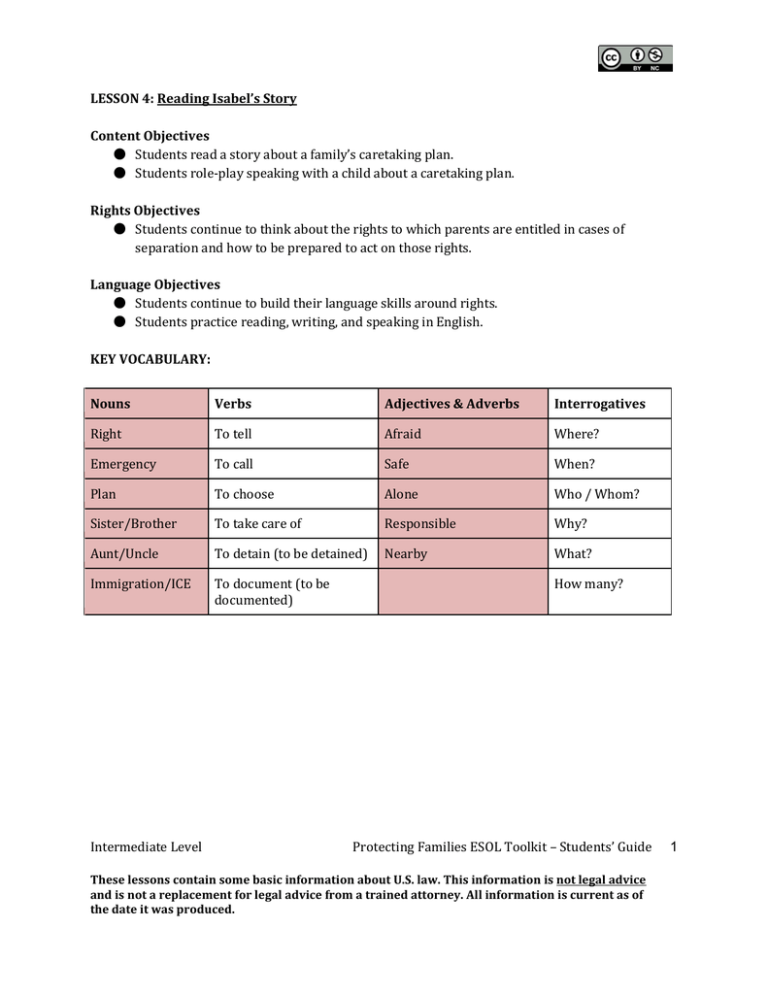
April 2016 LESSON 4: Reading Isabel’s Story Content Objectives ● Students read a story about a family’s caretaking plan. ● Students role-play speaking with a child about a caretaking plan. Rights Objectives ● Students continue to think about the rights to which parents are entitled in cases of separation and how to be prepared to act on those rights. Language Objectives ● Students continue to build their language skills around rights. ● Students practice reading, writing, and speaking in English. KEY VOCABULARY: Nouns Verbs Adjectives & Adverbs Interrogatives Right To tell Afraid Where? Plan To choose Alone Who / Whom? Emergency Sister/Brother Aunt/Uncle Immigration/ICE Intermediate Level To call To take care of Safe To detain (to be detained) To document (to be documented) Responsible Nearby When? Why? What? How many? Protecting Families ESOL Toolkit – Students’ Guide These lessons contain some basic information about U.S. law. This information is not legal advice and is not a replacement for legal advice from a trained attorney. All information is current as of the date it was produced. 1 April 2016 LESSON ACTIVITIES: PART A) Reading Isabel’s Story Read the story below as a class or in small groups. Write your answers to the questions that follow in the spaces provided. Discuss your answers in English (when possible) or your native language. My name is Isabel. I am from El Salvador, and I am a wife and the mother of a 12-year-old son. I am undocumented, but my husband Victor is documented, that is, he has a green card, and sometimes goes to El Salvador for business. Our son, Francisco, was born in the U.S. and is a citizen. Because I am undocumented, I am afraid that I may be detained by immigration. If I am detained and Victor is in El Salvador, Francisco could be left alone and afraid. Stop and discuss in English or your native language: ● Who is Isabel? ● Who is in Isabel’s family? ● Why is Isabel afraid? Francisco does not know that I am undocumented, and I used to be afraid to tell him. I was afraid because I did not want him to be worried, and I did not know what he would do if I was detained while Victor was in El Salvador. But now I have a plan, and I am not so afraid to talk to Francisco about what might happen. If I am detained, Francisco will call my friend Luisa, and Luisa will take care of him. Luisa is documented and lives nearby; I am arranging to grant her power of attorney so she can care for Francisco. I am also going to give Francisco Luisa’s cell phone number and tell him about our arrangement. Stop and discuss in English or your native language: ● Why was Isabel afraid to tell Francisco that she is undocumented? ● Who did Isabel choose to be Francisco’s emergency contact? Why do you think she chose her? ● What will Isabel tell Francisco to do if she is detained while Victor is in El Salvador? PART B) Role-Playing Isabel’s Discussion with Francisco With a partner, act out the conversation Isabel might have with Francisco about her family’s caretaking plan. Afterward, write a script for their conversation. Write at least ten lines in English or your native language, five for Isabel and five for Francisco. Each pair needs to write only one script. Intermediate Level Protecting Families ESOL Toolkit – Students’ Guide These lessons contain some basic information about U.S. law. This information is not legal advice and is not a replacement for legal advice from a trained attorney. All information is current as of the date it was produced. 2 April 2016 PART C) Reflection As a class or in small groups, discuss the following questions in English (when possible) or your native language. If it will be helpful to you, write your answers in the spaces provided. Some parents choose not to talk to their children about what might happen if they, the parents, are detained or deported. Why is it difficult for parents to talk about this possibility with their children? What questions would you ask yourself when considering whether to talk to your child about the possibility of your being detained and/or deported? . . . . In your opinion, would having a caretaking plan make it easier for a parent to talk to his or her child about the possibility of being detained or deported? Why or why not? . . Intermediate Level Protecting Families ESOL Toolkit – Students’ Guide These lessons contain some basic information about U.S. law. This information is not legal advice and is not a replacement for legal advice from a trained attorney. All information is current as of the date it was produced. 3
